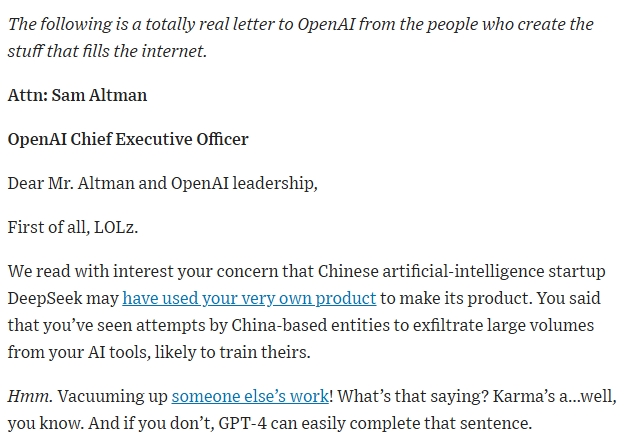The Chinese startup DeepSeek recently launched its open-source reasoning model R1, which has quickly ignited the entire AI technology field. Its "low-cost, high-performance" features have caused a plunge in the stock prices of American AI giants led by Nvidia and . Even US President Trump has called DeepSeek "the alarm bell for the US AI industry".
OpenAI Accuses DeepSeek of Copyright Infringement
Regarding the strong competition from the new rival, the UK's Financial Times reported yesterday (29th) that claimed to have found evidence that DeepSeek used its models through "distillation" technology, and indicated that DeepSeek may have infringed on 's intellectual property rights.
However, has not yet provided clear evidence, and whether the behavior is illegal is also a subject of much legal debate. Against this backdrop, the Wall Street Journal recently published an open letter signed by a group of content creators, mocking for also "stealing" online content to train AI, and now accusing others, which is "karma".
Further Reading: Has Evidence That "DeepSeek Infringed" and Misused GPT Distillation Technology to Train Chinese AI
Open Letter Harshly Criticizes OpenAI: Karma is a Bitch
This open letter signed by "global content creators" is full of sarcasm from the beginning:
Oh, stealing someone else's achievements! How does that saying go again? Karma is a... You know, if you don't understand, GPT-4 can help you complete that sentence.
The letter directly points out that has been relying on scraping online content to train AI, and now it is accusing others of plagiarism, which is "double standards" that are unacceptable. The letter also mentions the incident last year where ChatGPT's "voice" was extremely similar to Hollywood star Scarlett Johansson, questioning 's transparency on AI training data.
The letter also points out 's previous promise to launch a "Media Manager" AI tool that would allow creators to choose whether their content could be used for AI training, but it has not been fulfilled yet. When product manager Kevin Weil was asked about this at the Davos forum, he only responded:
We are still working on it, and we will announce more content when we have more to share.
Although has recently signed licensing agreements with media and publishers, such as the Wall Street Journal and the Financial Times, many writers and artists still believe that has used their works without permission.

US Navy Takes the Lead, Bans the Use of DeepSeek
Just as is likely to initiate legal action, the US Navy has taken the lead and imposed a complete ban on the use of DeepSeek by military personnel, indicating that this AI war has gone beyond just a technical dispute and involves national security.
According to a CNBC report, the US Navy has issued a directive to all its members, prohibiting them from using DeepSeek "in any way", citing "potential security and ethical risks associated with the origin and use of the model".
This internal email from the Office of the Chief Information Officer of the Navy states: "Please note the security risks posed by DeepSeek, and all Navy personnel 'must' avoid using its AI technology, whether for work or personal purposes." The order applies to all units related to the US Navy, indicating that the US military's caution towards Chinese AI technology has been upgraded.
This ban is the first step in the US government's efforts to block DeepSeek, and whether it will be extended to other federal agencies or lead to even stricter AI regulations remains to be observed.
US Government on Alert, Commerce Department May Issue a Ban
On the other hand, with DeepSeek becoming the most downloaded free app on the US Apple App Store recently, experts speculate that the US Commerce Department may intervene to investigate and even require Apple and Google to remove the DeepSeek app from the US market, in order to curb the development of Chinese AI technology.
AI industry expert Paul Triolo analyzed:
The US government's means to restrict open-source AI are limited, as DeepSeek's technology may have already spread through the open-source community, and blocking it alone cannot completely stop its influence.
Furthermore, Lawrence Ward, a partner at the US law firm Dorsey & Whitney, pointed out:
If the US finds that DeepSeek has violated the ban on high-tech chips against China, such as using the banned NVIDIA chips to train AI, it may impose civil or criminal penalties on the company.







